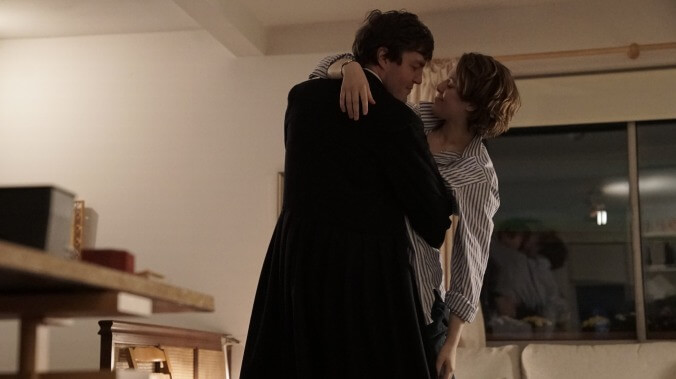Joanna Hogg’s gorgeous The Souvenir looks at a bad romance through the fog of memory


It’s over the course of a single conversation that Julie, the twentysomething protagonist of Joanna Hogg’s The Souvenir, learns that film school is a crock, and also that her boyfriend is a drug addict. Both bombshells come courtesy of pompous artist Patrick (Richard Ayoade), who drops them casually, and in quick succession, at the dinner party he’s hosting. The first is more of an opinion, admittedly, albeit an informed one laced with some good advice—“take advantage of the free equipment,” he more or less tells the young film student sitting across from him. But that second piece of information? That’s not so debatable, even if it is news to Julie, who’s just beginning to see the truth about the mysterious man who’s latched onto her heart (and wallet) like a parasite.
The Souvenir is all about growing pains, romantic and creative. Those two aspects of its heroine’s life don’t intersect too often; they’re compartmentalized, the domestic bliss and distress broken up by cutaways to Julie bent over an editing block or badly botching a first directing gig. But one does influence the other, in ways that might only be clear with hindsight. Thankfully, Hogg, who made the underseen dramas Archipelago and Exhibition, has plenty of that. After all, the British writer-director was studying film herself in the England of the early 1980s, the setting of this uncommonly elegant and loosely autobiographical coming-of-age story.
Julie, the filmmaker’s fictionalized stand-in, is played by Honor Swinton Byrne, making her beautifully unstudied screen debut. (Though it’s the kind of performance often described as “out-of-nowhere,” the willowy 21-year-old star definitely came from somewhere: She’s the daughter of Tilda Swinton, who plays her onscreen mother here and who starred in Hogg’s thesis film, “Caprice,” around the time The Souvenir takes place.) We first see Julie at a party, snapping pictures, already experiencing life through a lens. But someone gets her to put the camera down: government official Anthony (Tom Burke, from the recent BBC adaptations of The Musketeers and War & Peace). He’s not, conventionally speaking, a dreamboat. But he is droll and witty, with a certain Orson Welles quality. He’s also older, and knows how to play the gap in age to his advantage.
The love story, such as it is, unfolds through glancing moments out of time, snapshots of a life. It isn’t long before Anthony is essentially inviting himself to come stay with Julie, turning their “platonic” sleeping arrangement into an opportunity for It Happened One Night flirting, then sealing the deal with love letters. Hogg shows us what Julie can’t see: the calculation of his seduction tactics, the way he preys on her admiration and guilelessness to worm his way into her affections (and family finances). And this is before his addiction begins to consume everything in its path. The key to the film’s bittersweet power is that it dramatizes this destructive, gaslighting relationship with the wisdom and insight only distance can provide, while still respecting the emotional truth of the infatuation that keeps it going, as during a getaway to Venice that Hogg stages as a swoony romantic reverie, never mind that it’s Julie’s mother unknowingly footing the bill.
This perspective, caught halfway between the clarity of now and the naiveté of then, informs Hogg’s vision of blossoming artistry, too. “You’re not trying to document some received idea of life up there on the docks?” Anthony cuttingly asks Julie when she first tells him about her big proposed project, a drama set among the working class of Sunderland. She wants to step outside of her own sheltered, privileged worldview, but what can she authentically say about a life so different than her own? Without quite suggesting that heartache breeds instant maturity, The Souvenir itself stands as a kind of rebuttal to her youthful pretensions and aspirations: a write-what-you-know vision of a creative soul emerging slowly from the smoldering wreckage of real experience. (Hogg, after all, lived a little before launching her own career—she was nearly 50 when she directed her first feature, Unrelated, in 2007.)
There are times when The Souvenir has the buttoned-up, removed manner of a costume drama. Certainly, it can feel like a movie from a different era, though that’s partially because Hogg shot whole stretches of it on glorious, grainy 16mm. Is celluloid so rare now that it confers an automatic exotic quality, to say nothing of how a dying format can create a kind of visual shorthand for the past? Offering colors and textures and a pale incandescence impossible to capture on digital, The Souvenir’s almost ethereal look suggests the scrim of imperfect memory. Or maybe just shuffling through faded old Polaroids—a sensation reinforced by Hogg’s decision to shoot scenes from striking, offbeat angles, capturing her characters in the reflection of puddles or from across rooms, as if these were the only views of the events she could find in her mind or photo album. It’s a visual representation of The Souvenir’s slightly detached empathy: that wistful affection you feel when looking back on the foibles of your own past, wondering how you could have ever been so young.